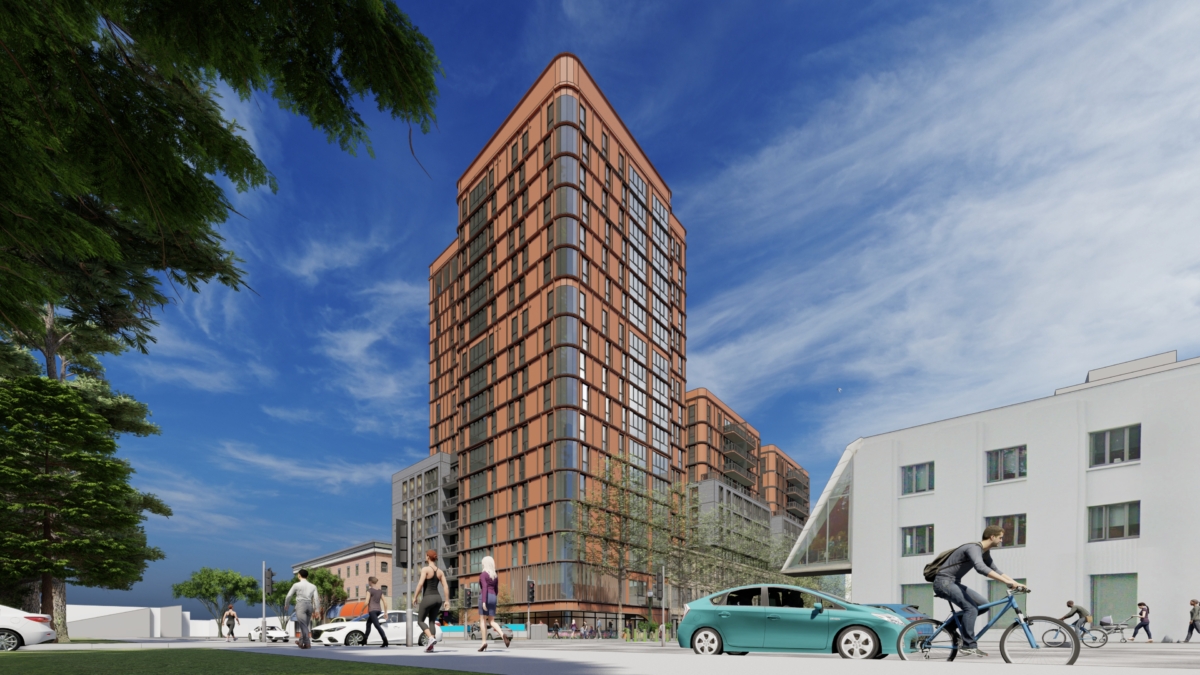
A developer known for building large apartment complexes in college towns across the country is eyeing the intersection of Center and Oxford streets for a 17-story high-rise across from UC Berkeley.
Chicago-based Core Spaces submitted an application Wednesday for the 283-unit development it’s calling Hub on Campus Berkeley. If approved, it would be the tallest type of building allowed under the city’s 2012 Downtown Area Plan, and would dramatically remake what is now a popular strip of restaurants and cafes.
Renderings for the project show a terra cotta-hued tower rising at the busy intersection, while another 11-story segment extends down most of the 2100 block of Center Street with a brick facade covering its lower stories and restaurants at street level. The project shares its name with other Hub complexes Core Spaces has built in cities such as Eugene, Oregon, and Madison, Wisconsin.
Jonathan Kubow, senior vice president of development at Core Spaces, said the “student-oriented” project at 2128 Oxford St. will ultimately house about 800 people, on a prime site just across Center Street from the Crescent Lawn entrance to UC Berkeley.
“We’re ecstatic to be entering in the Berkeley market,” Kubow said. “This location is just phenomenal.”
If past attempts to raise tall apartment buildings in downtown Berkeley are any indication, though, Core Spaces could be kicking off a contentious approval process.
The city’s Downtown Area Plan allows for the construction of three new buildings that are up to 180 feet tall. But the first project to seek approval under the plan, at 2211 Harold Way, fell apart after one of the city’s most contentious development fights.
That project was debated at 37 city meetings over three years, and challenged with an unsuccessful lawsuit by opponents; its developer ultimately scrapped the plans in early 2020, citing the cost of a community benefits package city officials required as a condition of its approval. A new developer submitted plans in July for an eight-story development at the site.
Former Berkeley Planning Manager Mark Rhoades represented the first Harold Way developer, and is now working with Core Spaces on its Hub project. Rhoades said he believes the city “learned lessons from Harold Way,” namely that “development projects have limitations with respect to what the community benefits can be if our city wants to have these buildings built.”
“We badly need housing,” Rhoades said, and the Core Spaces proposal “is ideally located and situated housing, targeting the market that is one of the most under-served in the community.”
Two other 180-foot-tall projects have moved forward downtown: One, a hotel at 2129 Shattuck Ave., is under construction across Center Street from the parcels eyed by Core Spaces, while the other, at Shattuck and Allston Way, received approval in 2019.
Adding to potential sources of controversy, though, the Hub development would replace two existing buildings along Oxford and Center streets that are home to more than a dozen businesses, including the restaurants East Bay Spice Company and Daryoush, as well as outposts of Top Dog, Bongo Burger and Purple Kow. Core Spaces purchased the properties in May.
Rhoades said the businesses have agreed to move, and Core Spaces will have options for them to rent in the new building. Asked whether the developer plans to give those businesses money to help with their moves, he said, “There are not relocation packages on the table.”
One of the existing buildings also has 16 rent-controlled apartment units, though all but one of them is vacant, according to Rhoades. While the project replaces those apartments with 16 units classified as “very low income,” reserved for renters making less than half of the area median income, Rhoades said it will not include any additional affordable units.
Instead, Core Spaces plans to pay an Affordable Housing Mitigation Fee estimated at more than $10 million.
Berkeley Mayor Jesse Arreguín said he wants to make sure the businesses and tenants affected by the project are made whole, and affordable units demolished in its construction are replaced.
“We will obviously have to evaluate the application,” Arreguín said. “But having student housing so close to campus addresses I think a really critical need that we have as a city, and helps increase the availability of housing for other people in our community.”
